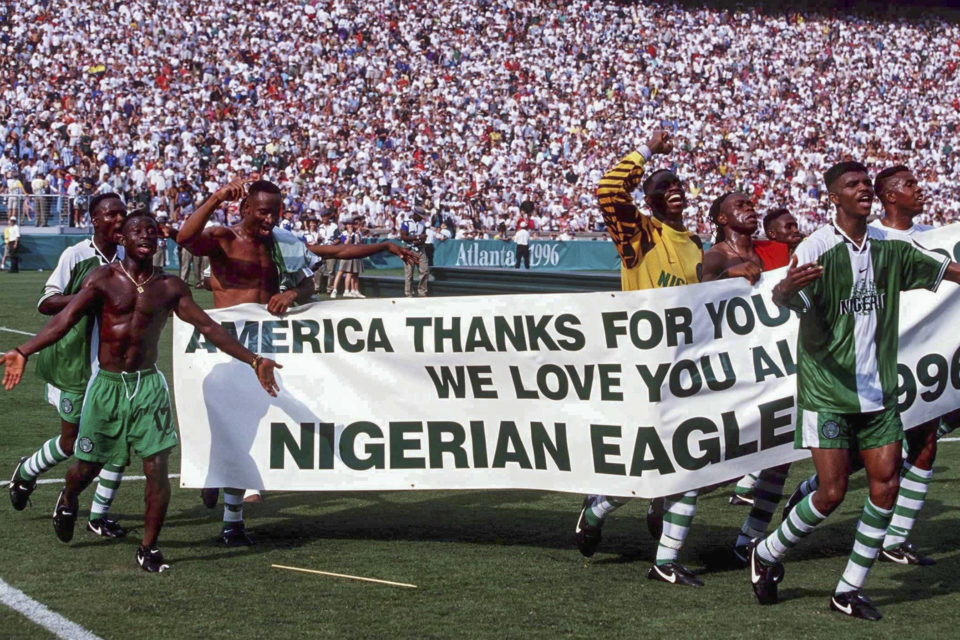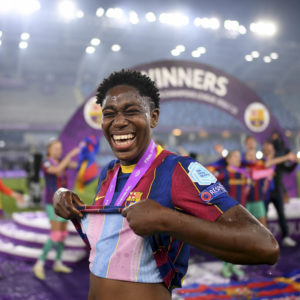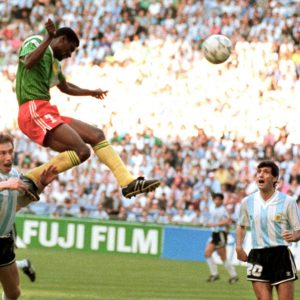What lies behind Africa’s elusive World Cup glory?
Men’s national football teams have done well in junior world tournaments, but that success hasn’t been replicated on the senior global stage. What causes this and how can it be corrected?
Author:
21 July 2021

In the summer of 1996, Spanish pop duo Los Del Río’s one-hit wonder Macarena was topping the charts when Nigeria’s football team arrived in Florida in the United States, an area renowned for its sandy beaches and wealthy neighbourhoods. They were there to take part in the Olympic Games held in Atlanta, Georgia, that year.
Temperatures averaged 31.6 degrees Celsius, but Nigeria’s Under-23 national team weren’t ruffled by the heat; in fact, they revelled in it. “We had some very good players heading into the 1996 Olympics,” says former Nigeria striker Emmanuel Amuneke, who was one of three overage players in the Olympics squad.
“Some of the players who were in 1994 [when Nigeria won the Africa Cup of Nations] were part of the Olympic squad and so knew what to expect in that tournament. By 1996, some of the guys had moved into good teams, playing at a high level and had matured. That sort of afforded us the possibility to be in the position to properly manage any game that came our way.”
Related article:
The blend of youthful exuberance and experience propelled the Super Eagles to gold in the Games. “We had played several competitions as a group. We didn’t have many issues gelling as a side,” says Amuneke. “From individual talent to collective [ability], we were ready and tactically there was a setup to manage the opponent properly.”
By properly, Amuneke means stifling and frustrating their opponents. His form at the Olympics wasn’t as beguiling as it was at the 1994 Fifa World Cup, but with a supernatural eye for goal he was an important asset to the team. With his three goals, Nwankwo Kanu was the main architect of Nigeria’s success as the West Africans sailed comfortably through the group stages and cruised past Mexico and Brazil to set up a date with Argentina in the final.
Twice Argentina led the game and twice Nigeria’s ability to summon what was their best level was made evident with two equalisers from Celestine Babayaro and Daniel Amokachi. The icing on the cake was a free kick laced with conviction that was executed by Amuneke in the nick of time to finish a heart-stopping fixture and ink Nigeria’s name in the annals of football history.
Hopes shift to Cameroon
Finally, an African side had struck gold at the Olympics and pundits felt a World Cup triumph was imminent. Four years later, another African nation was at it again. This time round it was Cameroon, Nigeria’s perennial rivals. Cameroon had won three Africa Cup of Nations (Afcon) titles – in 1984, 1988 and 2000 – beating Nigeria at all three finals and achieving the feat of becoming the lone African side to play at a World Cup quarterfinal, in 1990 in Italy.
But despite this pedigree, Cameroon weren’t donning the tag of favourites at the 2000 Olympics in Sydney, Australia. Patrick M’Boma, who was widely regarded as Africa’s best football export that year, having scooped the continent’s most valuable player distinction courtesy of his goals with Italian side Parma, headlined the Cameroon team.
A contingent of young, unproven players comprising Real Madrid’s Geremi, Arsenal’s Lauren Etame Mayer, Sheffield United attacker Patrick Suffo and Mallorca’s baby-faced assassin Samuel Eto’o had all demonstrated an insatiable desire for silverware and been drafted by former Cameroon international Jean-Paul Akono, who handled the management of the team.

“When we were leaving for Australia, we had some hopes that we could get a medal in either judo or athletics, but very few thought that we were going to grab gold in football,” says Hamad Kalkaba Malboum, president of Cameroon’s National Olympic and Sports Committee. “The majority of the star players from the Afcon-winning expedition, among them Rigobert Song and Marc-Vivien Foe, weren’t part of the trip so a lot of fans didn’t think highly of the team.”
Gearing up away from the spotlight under a less glamorous gaffer seems to have been beneficial for the side. “Nobody bothered about us,” says Suffo, who was part of the Cameroon team that returned with gold from Sydney.
“It was a big experience for us, especially as at that time we had a myriad of star players [as Cameroon], so a lot of them didn’t see the need to go for the Olympics. With lesser stars [who went to the Olympics], we had very few people thinking about us and very little pressure. Also, a lot of us went through the different national ranks together and played at the same academies so we knew ourselves pretty well.”
Big in Japan?
With two African nations having won Olympic gold back to back, the next global tournament, the 2002 World Cup in South Korea and Japan, provided the theatre for an African conquest on the world scene. Nigeria and Cameroon were regarded as the dark horses.
Pitted against Sweden, England and Argentina, Nigeria had an arduous journey ahead in their group. But Cameroon was slightly fortunate, finding themselves grouped with giants Germany along with Ireland and Saudi Arabia.
There was some significant buzz around the Cameroonian team, not just because the side had adopted a stylish sleeveless jersey at Afcon, but also because of how they had won their fourth trophy. Ten of the 23 players called up by Winfried Schafer, Cameroon’s fourth head coach within four years, had won both the Olympics and Afcon. But clouds were cast over the reigning African champions’ preparation.
Related article:
“There was pandemonium in the camp and our preparation was troubled in Paris,” Suffo says. “We spent almost 10 days in Paris not training properly because of bonus squabbles. It was just incredible and this was two to three weeks to our opening game in the World Cup. We took a flight that lasted almost 24 hours to Japan. When we got there we were exhausted and the time difference was killing us.”
“I remember walking the corridors at 3am and I saw guys just walking around very tired and not looking in their best shape. That’s what destroyed our preparation and eventually our trip to Japan. We were a top team and we could’ve smashed through that tournament, but the authorities had changed the way they treated us and that was a major problem for us.”
It wasn’t long before the behind-the-scenes mayhem spilt into public viewing as Cameroon, shy of their trademark high-octane football and erudition, were held to a 1-1 tie by Ireland before scrapping a narrow 1-0 win over Saudi Arabia, a side that Germany mercilessly battered 8-0. They proved to be no match for Die Mannschaft, who edged Cameroon 2-0.
Behind the defeat
Cameroon’s mixed fortunes at the Olympics and the World Cup raised an important question: Why have African teams done so well in junior tournaments but struggled to emulate that at the World Cup at senior level?
“Do you ever hear European or South American teams go to the World Cup worrying about their bonuses?” Amuneke asks, rhetorically. “We have to improve on the management around teams. There are often a lot of distractions around them and the administrators have to do their jobs properly.”
Since 2010, both Cameroon and Nigeria have had 10 coaches each and the perpetual changes seem to be catching up with the sides’ performances. Within that period, Cameroon failed to qualify for the 2012 and 2013 Afcon, crashed out of the group stages at the 2010 and 2014 World Cup, finishing as the outfit with the worst performance in Brazil. Nigeria’s three World Cup stints ended abruptly with an honourable round-of-16 appearance in 2014.
Related article:
“We keep changing coaches all the time,” Suffo says. “What tangible project can any serious team build with new coaches all the time? A new coach brings in his players and it’s a perpetual readjustment for the squad. You need stability if you want to win. The team that dominated in 2000 and 2002 was put together between 1997 and 1999. That was a serious project.”
Success in junior national teams is heavily reliant on talent and cohesiveness, but many factors make a good team at senior national team level, where there are also a lot of things to juggle – from egos to club commitments and administrative challenges, with more interference from the ruling elite who want to use that success to promote themselves and their standing. The other difference is that in junior competitions, many African players are either looking to earn lucrative contracts abroad or cement their places in European clubs.
“It’s time for African nations to start trusting their coaches and setting up programmes for locals to thrive. That’s a fundamental pillar to success,” Amuneke emphasises. “We Africans need to establish long-term plans. There will be mistakes, but we’ll learn and we’ll get better. If we believe this then we can do wonderful things ahead.”



